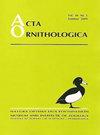迁徙小燕飞行性能与脂肪负荷和翅膀形态的关系
IF 1.3
4区 生物学
Q3 ORNITHOLOGY
引用次数: 1
摘要
摘要候鸟已经进化出积累脂肪储备的能力,为它们的迁徙之旅提供燃料。然而,燃料负荷的增加会导致体重增加,预计这会损害飞行性能并增加捕食风险。先前的研究结果是矛盾的,一些研究报告了脂肪负荷对飞行性能的有害影响,而另一些研究则没有显示出这种影响。此外,还没有研究调查专性航空食虫动物的脂肪负荷与飞行性能之间的关系,已知专性航空食虫动物在陆上迁徙时仅积累中等脂肪负荷,而不跨越海洋或沙漠等广泛的生态屏障。在这项研究中,我们调查了波兰(中欧)秋季南迁初期,幼年Barn Swallows Hirundo rustica的短期飞行性能(飞行机动性、速度和加速度)与脂肪负荷的个体间变化。我们通过全身电导率(TOBEC)扫描仪评估了个体吞咽脂肪负荷。为了以标准化的方式评估短期飞行性能,我们使用了飞行隧道。我们对机翼形态的独立影响进行了统计控制,预计机翼形态会影响飞行性能。青少年脂肪负荷平均为瘦体重的7.5%(范围为0.2-20.5),但我们没有发现脂肪量对短期飞行性能特征的负面影响。与苗条的人相比,脂肪量较大的人达到了更高的速度,这符合理论预期。然而,脂肪质量并不能显著预测飞行操纵性或加速度。结果表明,幼年仓燕在陆上迁徙过程中积累的相对较小的脂肪负荷不会影响短期飞行性能。本文章由计算机程序翻译,如有差异,请以英文原文为准。
Flight Performance of Migrating Juvenile Barn Swallows Hirundo rustica in Relation to Fat Load and Wing Morphology
Abstract. Migratory birds have evolved the ability to accumulate fat reserves to fuel their migratory journeys. However, increased fuel load leads to an increased body mass, which is expected to impair flight performance and increase predation risk. Results of previous research are contradictory, with some studies reporting detrimental effects of fat load on flight performance, while others showing no such influences. Furthermore, no studies have investigated the relationship between fat load and flight performance in obligate aerial insectivores, which are known to accumulate only moderate fat loads while migrating overland and not crossing wide ecological barriers such as oceans or deserts. In this study we investigated the inter-individual variation in short-term flight performance (flight manoeuvrability, velocity and acceleration) in juvenile Barn Swallows Hirundo rustica in relation to fat load in Poland (central Europe), during the initial stages of autumn southward migration. We evaluated individual swallow fat loads by means of a Total Body Electrical Conductivity (TOBEC) scanner. In order to evaluate short-term flight performance in a standardised manner we used flight tunnels. We controlled statistically for the independent effect of wing morphology, which can be expected to influence flight performance. Juvenile fat loads were on average 7.5% (range 0.2–20.5) of lean body mass, but we found no negative effect of the fat mass on short-term flight performance traits. Individuals with larger fat mass reached higher velocity compared to leaner ones, which is in line with theoretical expectations. However, fat mass did not significantly predict flight manoeuvrability or acceleration. The results indicate that relatively small fat loads accumulated by juvenile Barn Swallows during overland migration do not impair short-term flight performance.
求助全文
通过发布文献求助,成功后即可免费获取论文全文。
去求助
来源期刊

Acta Ornithologica
生物-鸟类学
CiteScore
2.10
自引率
0.00%
发文量
14
审稿时长
>12 weeks
期刊介绍:
Publishes scientific papers (original research reports, reviews, short notes, etc.) and announcements from all fields of ornithology. All manuscripts are peer-reviewed.
Established in 1933 as Acta Ornithologica Musei Zoologici Polonici, since 1953 continued under the present title.
Published twice a year by the Natura Optima Dux Foundation under the auspices of the Museum and Institute of Zoology, Polish Academy of Sciences.
 求助内容:
求助内容: 应助结果提醒方式:
应助结果提醒方式:


